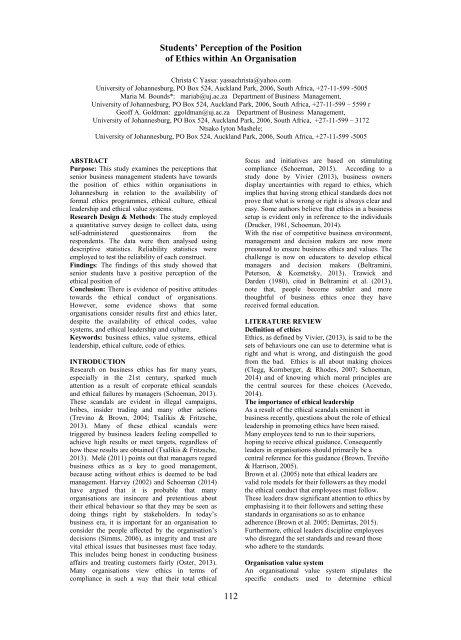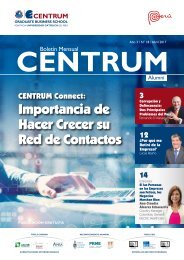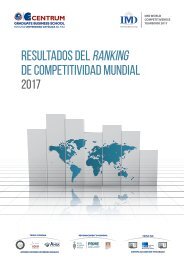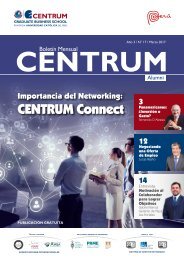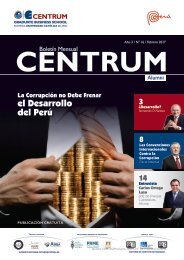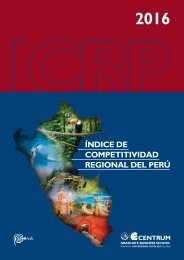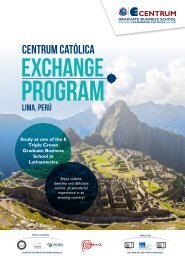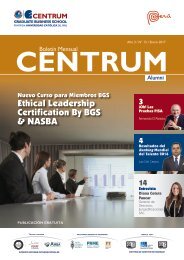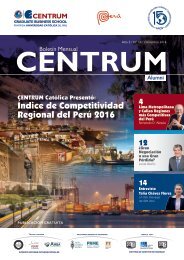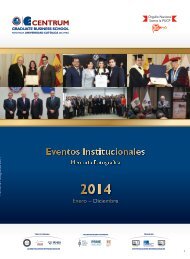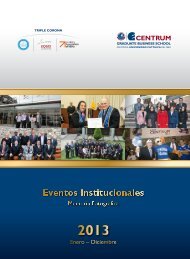Pan-Pacific Conference XXXIV. Designing New Business Models in Developing Economies
This publication represents the Proceedings of the 34th Annual Pan-Pacific Conference being held in Lima, Peru May 29-31, 2017. The Pan-Pacific Conference has served as an important forum for the exchange of ideas and information for promoting understanding and cooperation among the peoples of the world since 1984. Last year, we had a memorable conference in Miri, Malaysia, in cooperation with Curtin University Sarawak, under the theme of “Building a Smart Society through Innovation and Co-creation.” Professor Pauline Ho served as Chair of the Local Organizing Committee, with strong leadership support of Pro Vice-Chancellor Professor Jim Mienczakowski and Dean Jonathan Winterton.
This publication represents the Proceedings of the 34th Annual Pan-Pacific Conference being held in Lima, Peru May 29-31, 2017. The Pan-Pacific Conference has served as an important forum for the exchange of ideas and information for promoting understanding and cooperation among the peoples of the world since 1984. Last year, we had a memorable conference in Miri, Malaysia, in cooperation with Curtin University Sarawak, under the theme of “Building a Smart Society through Innovation and Co-creation.” Professor Pauline Ho served as Chair of the Local Organizing Committee, with strong leadership support of Pro Vice-Chancellor Professor Jim Mienczakowski and Dean Jonathan Winterton.
Create successful ePaper yourself
Turn your PDF publications into a flip-book with our unique Google optimized e-Paper software.
Students’ Perception of the Position<br />
of Ethics with<strong>in</strong> An Organisation<br />
Christa C Yassa: yassachrista@yahoo.com<br />
University of Johannesburg, PO Box 524, Auckland Park, 2006, South Africa, +27-11-599 -5005<br />
Maria M. Bounds*: mariab@uj.ac.za Department of <strong>Bus<strong>in</strong>ess</strong> Management,<br />
University of Johannesburg, PO Box 524, Auckland Park, 2006, South Africa, +27-11-599 – 5599 r<br />
Geoff A. Goldman: ggoldman@uj.ac.za Department of <strong>Bus<strong>in</strong>ess</strong> Management,<br />
University of Johannesburg, PO Box 524, Auckland Park, 2006, South Africa, +27-11-599 – 3172<br />
Ntsako Iyton Mashele;<br />
University of Johannesburg, PO Box 524, Auckland Park, 2006, South Africa, +27-11-599 -5005<br />
ABSTRACT<br />
Purpose: This study exam<strong>in</strong>es the perceptions that<br />
senior bus<strong>in</strong>ess management students have towards<br />
the position of ethics with<strong>in</strong> organisations <strong>in</strong><br />
Johannesburg <strong>in</strong> relation to the availability of<br />
formal ethics programmes, ethical culture, ethical<br />
leadership and ethical value systems.<br />
Research Design & Methods: The study employed<br />
a quantitative survey design to collect data, us<strong>in</strong>g<br />
self-adm<strong>in</strong>istered questionnaires from the<br />
respondents. The data were then analysed us<strong>in</strong>g<br />
descriptive statistics. Reliability statistics were<br />
employed to test the reliability of each construct.<br />
F<strong>in</strong>d<strong>in</strong>gs: The f<strong>in</strong>d<strong>in</strong>gs of this study showed that<br />
senior students have a positive perception of the<br />
ethical position of<br />
Conclusion: There is evidence of positive attitudes<br />
towards the ethical conduct of organisations.<br />
However, some evidence shows that some<br />
organisations consider results first and ethics later,<br />
despite the availability of ethical codes, value<br />
systems, and ethical leadership and culture.<br />
Keywords: bus<strong>in</strong>ess ethics, value systems, ethical<br />
leadership, ethical culture, code of ethics.<br />
INTRODUCTION<br />
Research on bus<strong>in</strong>ess ethics has for many years,<br />
especially <strong>in</strong> the 21st century, sparked much<br />
attention as a result of corporate ethical scandals<br />
and ethical failures by managers (Schoeman, 2013).<br />
These scandals are evident <strong>in</strong> illegal campaigns,<br />
bribes, <strong>in</strong>sider trad<strong>in</strong>g and many other actions<br />
(Trev<strong>in</strong>o & Brown, 2004; Tsalikis & Fritzsche,<br />
2013). Many of these ethical scandals were<br />
triggered by bus<strong>in</strong>ess leaders feel<strong>in</strong>g compelled to<br />
achieve high results or meet targets, regardless of<br />
how these results are obta<strong>in</strong>ed (Tsalikis & Fritzsche,<br />
2013). Melé (2011) po<strong>in</strong>ts out that managers regard<br />
bus<strong>in</strong>ess ethics as a key to good management,<br />
because act<strong>in</strong>g without ethics is deemed to be bad<br />
management. Harvey (2002) and Schoeman (2014)<br />
have argued that it is probable that many<br />
organisations are <strong>in</strong>s<strong>in</strong>cere and pretentious about<br />
their ethical behaviour so that they may be seen as<br />
do<strong>in</strong>g th<strong>in</strong>gs right by stakeholders. In today’s<br />
bus<strong>in</strong>ess era, it is important for an organisation to<br />
consider the people affected by the organisation’s<br />
decisions (Simms, 2006), as <strong>in</strong>tegrity and trust are<br />
vital ethical issues that bus<strong>in</strong>esses must face today.<br />
This <strong>in</strong>cludes be<strong>in</strong>g honest <strong>in</strong> conduct<strong>in</strong>g bus<strong>in</strong>ess<br />
affairs and treat<strong>in</strong>g customers fairly (Oster, 2013).<br />
Many organisations view ethics <strong>in</strong> terms of<br />
compliance <strong>in</strong> such a way that their total ethical<br />
focus and <strong>in</strong>itiatives are based on stimulat<strong>in</strong>g<br />
compliance (Schoeman, 2015). Accord<strong>in</strong>g to a<br />
study done by Vivier (2013), bus<strong>in</strong>ess owners<br />
display uncerta<strong>in</strong>ties with regard to ethics, which<br />
implies that hav<strong>in</strong>g strong ethical standards does not<br />
prove that what is wrong or right is always clear and<br />
easy. Some authors believe that ethics <strong>in</strong> a bus<strong>in</strong>ess<br />
setup is evident only <strong>in</strong> reference to the <strong>in</strong>dividuals<br />
(Drucker, 1981, Schoeman, 2014).<br />
With the rise of competitive bus<strong>in</strong>ess environment,<br />
management and decision makers are now more<br />
pressured to ensure bus<strong>in</strong>ess ethics and values. The<br />
challenge is now on educators to develop ethical<br />
managers and decision makers (Beltram<strong>in</strong>i,<br />
Peterson, & Kozmetsky, 2013). Trawick and<br />
Darden (1980), cited <strong>in</strong> Beltram<strong>in</strong>i et al. (2013),<br />
note that, people become subtler and more<br />
thoughtful of bus<strong>in</strong>ess ethics once they have<br />
received formal education.<br />
LITERATURE REVIEW<br />
Def<strong>in</strong>ition of ethics<br />
Ethics, as def<strong>in</strong>ed by Vivier, (2013), is said to be the<br />
sets of behaviours one can use to determ<strong>in</strong>e what is<br />
right and what is wrong, and dist<strong>in</strong>guish the good<br />
from the bad. Ethics is all about mak<strong>in</strong>g choices<br />
(Clegg, Kornberger, & Rhodes, 2007; Schoeman,<br />
2014) and of know<strong>in</strong>g which moral pr<strong>in</strong>ciples are<br />
the central sources for these choices (Acevedo,<br />
2014).<br />
The importance of ethical leadership<br />
As a result of the ethical scandals em<strong>in</strong>ent <strong>in</strong><br />
bus<strong>in</strong>ess recently, questions about the role of ethical<br />
leadership <strong>in</strong> promot<strong>in</strong>g ethics have been raised.<br />
Many employees tend to run to their superiors,<br />
hop<strong>in</strong>g to receive ethical guidance. Consequently<br />
leaders <strong>in</strong> organisations should primarily be a<br />
central reference for this guidance (Brown, Treviño<br />
& Harrison, 2005).<br />
Brown et al. (2005) note that ethical leaders are<br />
valid role models for their followers as they model<br />
the ethical conduct that employees must follow.<br />
These leaders draw significant attention to ethics by<br />
emphasis<strong>in</strong>g it to their followers and sett<strong>in</strong>g these<br />
standards <strong>in</strong> organisations so as to enhance<br />
adherence (Brown et al. 2005; Demirtas, 2015).<br />
Furthermore, ethical leaders discipl<strong>in</strong>e employees<br />
who disregard the set standards and reward those<br />
who adhere to the standards.<br />
Organisation value system<br />
An organisational value system stipulates the<br />
specific conducts used to determ<strong>in</strong>e ethical<br />
112


